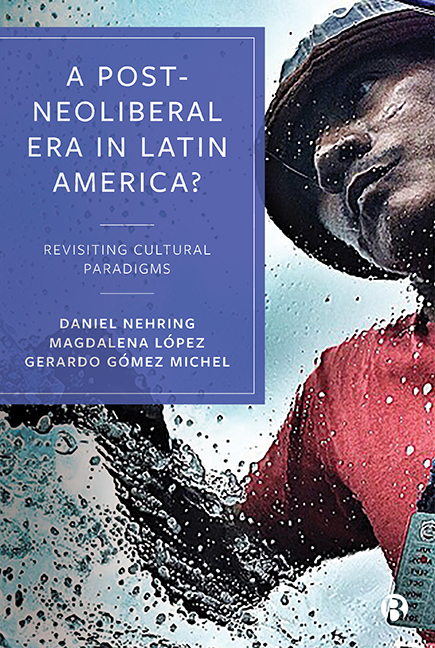Book contents
- Frontmatter
- Contents
- List of Tables and Figures
- Notes on Contributors
- 1 Introduction: Everyday Life in (Post-)Neoliberal Latin America
- 2 Imaginaries, Sociability and Cultural Patterns in the Post-Neoliberal Era: A Glance at the Argentinean, Paraguayan, and Venezuelan Experiences
- 3 Making Neoliberal Selves: Popular Psychology in Contemporary Mexico
- 4 From Uribe’s “Democratic Security” to Santo’s Peace Accords with the FARC: Hate, Fear, Hope and other Emotions in Contemporary Colombian Politics
- 5 Cine Bajo Tierra: Ecuador’s Booming Underground Cinema in the Aftermath of the Neoliberal Era
- 6 Neoliberalising Humanity: Culture and Popular Participation in the Case of the Street Market of Caruaru, Brazil
- 7 The Contribution of the Catholic Magazine Espacio Laical and the Constitution to the Cuban Public Sphere
- 8 Argentina: The Philosophical Resistance to the Conquest of the Soul1
- 9 Fleeing (Post-)Chávez Memories: The 1990s and the Black Friday Generation
- 10 Re-imagined Community: The Mapuche Nation in Neoliberal Chile
- 11 Neoliberalism and the Negotiation of the American Dream in Contemporary Latina Narratives
- 12 Bare Life in Contemporary Mexico: Everyday Violence and Folk Saints
- Index
8 - Argentina: The Philosophical Resistance to the Conquest of the Soul1
Published online by Cambridge University Press: 20 April 2022
- Frontmatter
- Contents
- List of Tables and Figures
- Notes on Contributors
- 1 Introduction: Everyday Life in (Post-)Neoliberal Latin America
- 2 Imaginaries, Sociability and Cultural Patterns in the Post-Neoliberal Era: A Glance at the Argentinean, Paraguayan, and Venezuelan Experiences
- 3 Making Neoliberal Selves: Popular Psychology in Contemporary Mexico
- 4 From Uribe’s “Democratic Security” to Santo’s Peace Accords with the FARC: Hate, Fear, Hope and other Emotions in Contemporary Colombian Politics
- 5 Cine Bajo Tierra: Ecuador’s Booming Underground Cinema in the Aftermath of the Neoliberal Era
- 6 Neoliberalising Humanity: Culture and Popular Participation in the Case of the Street Market of Caruaru, Brazil
- 7 The Contribution of the Catholic Magazine Espacio Laical and the Constitution to the Cuban Public Sphere
- 8 Argentina: The Philosophical Resistance to the Conquest of the Soul1
- 9 Fleeing (Post-)Chávez Memories: The 1990s and the Black Friday Generation
- 10 Re-imagined Community: The Mapuche Nation in Neoliberal Chile
- 11 Neoliberalism and the Negotiation of the American Dream in Contemporary Latina Narratives
- 12 Bare Life in Contemporary Mexico: Everyday Violence and Folk Saints
- Index
Summary
Historical context
In 1976, a terrible dictatorship was established in Argentina, even before Foucault (2007, p.265) claimed with crystal clarity that the fundamental difference between classical liberalism and neoliberalism was the substitution of the homo economicus—related to the exchange—by the homo economicus as entrepreneur of himself (lecture delivered on 14 March 1979); and also before Margaret Thatcher confirmed Foucault's analysis stating that: “Economics are the method; the object is to change the heart and soul.” In the same year, Milton Friedman received the Nobel Prize in Economics. The explicit purpose of the Military Junta was to promote a profound cultural transformation, based on the premise that the causes of the alleged “underdevelopment” were not so much economical but cultural and political.
Nevertheless, as García Delgado and Molina (2006) pointed out, the problem is not related to a sort of inevitable structural poverty, due to the culture of our people. It is a matter of a decline in society, produced by the policy orientation of the dictatorship. Until then, the income distribution was similar to that of the countries from Southern Europe with an almost frictional unemployment. Until the coup d’état, Argentina had a poverty rate of 8% and the best distributive structure of income in Latin America. However, 1976 was a turning point; the surge of the neoliberal model promoted a process of over-indebtedness, wealth concentration, unrestricted opening of markets with an unfavorable exchange rate for national industry, labor flexibilization, with the insertion of a competitive globalization of “savage capitalism” that “strengthened the asymmetries and transfers of resources from the periphery to the center. This concept differs from thinking about inequality as a problem related to culture, corruption and poor institutional quality.” (García Delgado and Molina, 2006)
Despite the overwhelming adverse evidence, it is still commonplace to blame all the ills of our society on that culture, the maximum expression of which would be Peronism. In fact, the great majority of disappeared people during the dictatorship were Peronist political, trade union, and social leaders. The motto of the Ministry of Economics during the dictatorship was “towards a change of mentality.” The current Argentine situation, in terms of advances of neoliberalism as well as resistances to it, cannot be understood without referring to the dictatorship.
- Type
- Chapter
- Information
- A Post-Neoliberal Era in Latin America?Revisiting Cultural Paradigms, pp. 159 - 176Publisher: Bristol University PressPrint publication year: 2019



